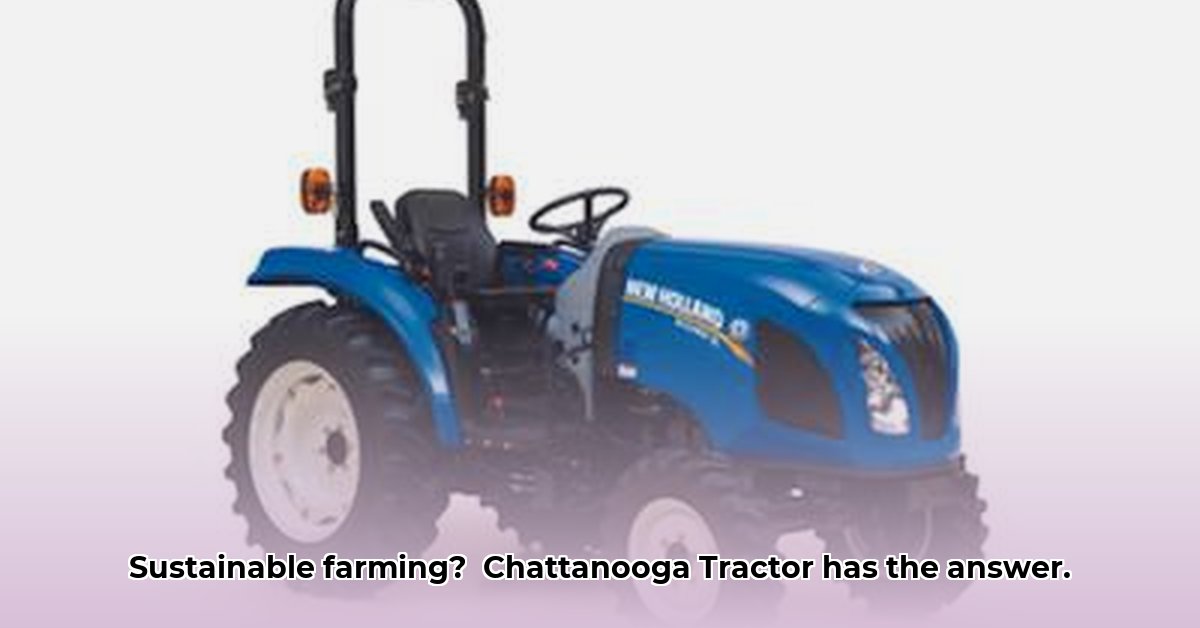
Navigating the Shifting Landscape of Sustainable Agriculture in the Southeast
Chattanooga Tractor and Equipment isn't just a dealership; it's a microcosm of the evolving agricultural landscape in the Southeast. Their inventory, featuring brands like New Holland, Mahindra, and Yanmar, reflects a diverse customer base with varying needs and farm sizes. This diversity speaks volumes about a broader trend: the increasing adoption of resilient and diversified farming practices. But what does this mean in practice? How are these farmers adapting their equipment choices to meet both their economic and environmental goals? The answers are multifaceted and reveal opportunities for growth across the board.
The Balancing Act: New Versus Used Equipment
Chattanooga Tractor's blend of new and used equipment highlights a critical challenge for many farmers: managing costs. Farming is a financially demanding enterprise, and purchasing used equipment offers a crucial means for farmers to acquire necessary tools without incurring crippling debt. However, a lack of detailed online information about their used inventory presents a significant opportunity for improvement. Increased transparency – clearer descriptions and readily available information – would benefit everyone involved, including farmers, researchers and policymakers striving to better understand market dynamics.
"The lack of detailed information limits our ability to conduct thorough market analysis," states Dr. Amelia Hernandez, Agricultural Economist at the University of Tennessee. "Improved online accessibility would significantly enhance our understanding of equipment adoption trends and the economic realities faced by farmers."
Sustainable Practices: Challenges and Opportunities
The variety of brands available at Chattanooga Tractor underscores the diverse needs of Southeastern farmers. The region's varied geography and crop production necessitate flexible equipment. But are farmers proactively seeking fuel-efficient machinery and precision agriculture technologies? The answer is complex and necessitates further investigation. The future of environmentally responsible agriculture hinges on technological innovation, and Chattanooga Tractor's adaptation to this growing demand will be critical for its long-term success.
What percentage of Chattanooga Tractor's sales are currently comprised of fuel-efficient equipment? This data, coupled with a deeper understanding of farmer purchasing decisions, would paint a clearer picture of the sustainability landscape.
A Path Forward: Actionable Strategies for Growth
The current market reveals several areas ripe for improvement:
1. Enhancing Transparency and Market Visibility: Chattanooga Tractor should prioritize improving the detailed online descriptions of its used equipment inventory as a short-term priority. This will directly benefit customers, and improve the data available for market analysis.
2. Leveraging Technology for Enhanced Customer Relations: A long-term goal should be the implementation of a comprehensive Customer Relationship Management (CRM) system. This will facilitate stronger customer relationships, streamline sales tracking, and provide invaluable data for future strategic decision-making.
3. Fostering Collaboration and Research: Partnering with agricultural researchers and policymakers will yield valuable data about farmer needs and trends. This collaboration will provide valuable insights that can guide future purchasing behaviors and policy decisions.
Mitigating the Risks: A Proactive Approach
The agricultural sector faces several challenges:
| Risk Factor | Likelihood | Impact | Mitigation Strategies |
|---|---|---|---|
| Lack of data transparency | High | Moderate | Improve data collection and sharing; partner with universities and research institutions. |
| Equipment becoming outdated | Moderate | Moderate | Offer trade-in programs; actively promote newer, more sustainable technologies. |
| Economic downturns | Moderate | High | Diversify revenue streams; offer additional services like equipment repair and maintenance. |
| Climate change impacts | High | High | Promote climate-resilient farming practices; promote drought-resistant crops and water-efficient equipment. |
| Competition from larger dealers | Moderate | Moderate | Focus on exceptional customer service and specialized sustainable agriculture equipment. |
Regulations and the Future of Sustainable Agriculture
Environmental regulations will play a defining role in the future of agriculture. Emission standards, fuel efficiency norms, and equipment disposal practices will shape the market. Chattanooga Tractor, and farmers alike, must proactively monitor regulatory changes and technological advancements to ensure long-term viability.
How will new emissions standards impact the demand for older, less efficient equipment? Assessing the interplay between regulations and market trends is crucial for strategic planning.
Finding Affordable Used Sustainable Equipment in Tennessee
Tennessee's agricultural diversity creates a complex used equipment market. Finding affordable, sustainable options requires a strategic approach.
Navigating the Tennessee Used Equipment Market
Tennessee boasts a diverse agricultural landscape, leading to a robust used equipment market. Locating the right equipment requires careful planning and knowledge of available resources.
Sourcing Affordable Sustainable Equipment: A Step-by-Step Guide
- Explore Online Marketplaces: Use websites like TractorHouse or Machinery Pete, filtering by location and features, and always confirming seller ratings.
- Check Local Dealerships: Dealerships often offer used equipment and servicing, extending peace of mind.
- Attend Farm Auctions: This can be a viable path to acquiring equipment, but thorough research and a realistic budget are crucial.
- Utilize Your Network: Connect with other farmers and participate in agricultural events for valuable inside information.
- Contact Farmers Directly: Farmers upgrading equipment may offer private sales with competitive pricing.
Prioritizing Sustainable Attributes in Used Equipment
Sustainable practices extend beyond solely buying new equipment. Consider:
- Fuel Efficiency: Prioritize lower fuel consumption to reduce both costs and environmental impact.
- Durability and Reliability: Invest in well-maintained machines to reduce the need for frequent replacement.
- Repair and Maintenance: Evaluate parts availability and the cost of routine maintenance.
- Adaptability: Choose equipment that can evolve with your changing agricultural practices.
A Comprehensive Equipment Assessment
Before purchasing, conduct a thorough inspection:
- Meticulous Examination: Take your time inspecting the machine's functionality, noting any signs of wear or potential issues.
- Test Run: Operate the equipment to identify any hidden issues before committing.
- Review Documentation: Scrutinize maintenance records and all relevant paperwork.
By employing these strategies, Tennessee farmers can navigate the used equipment market effectively and responsibly, enhancing their sustainability goals.